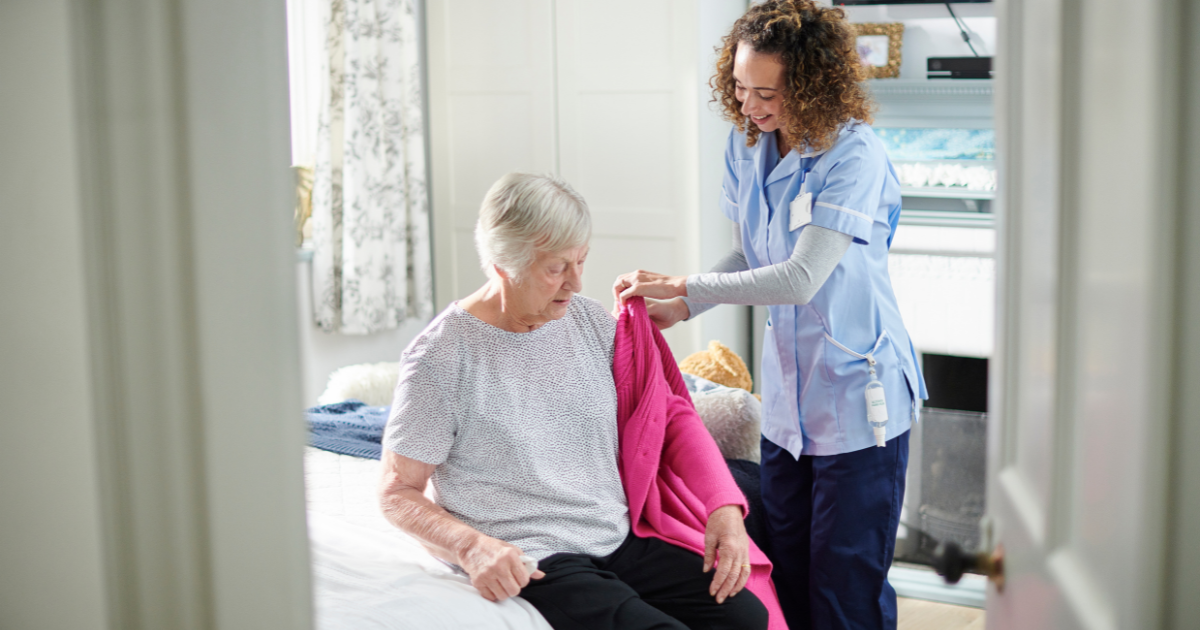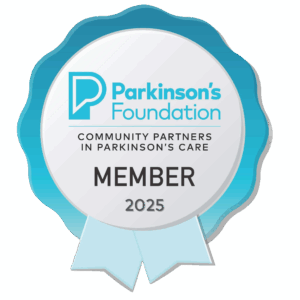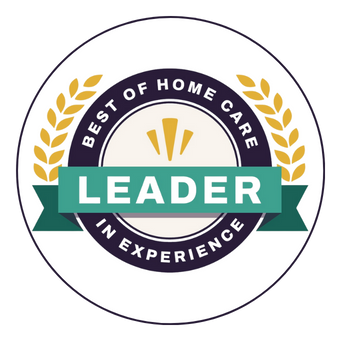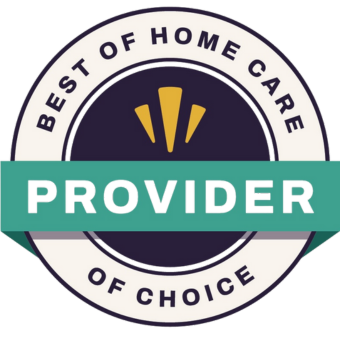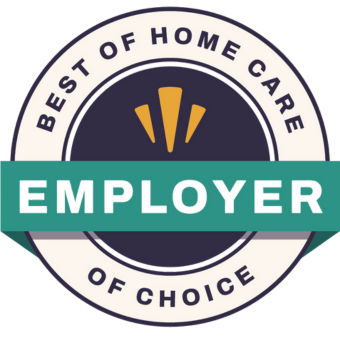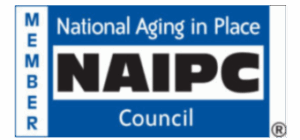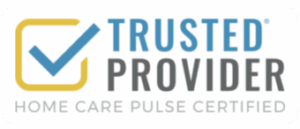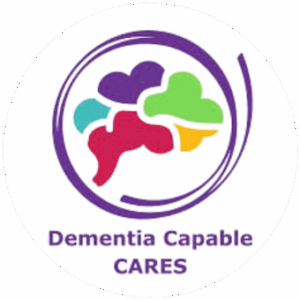Have you always wanted to work in the healthcare field but weren’t sure how to get started? If so, you may want to consider becoming a professional caregiver. While working alongside other healthcare professionals in Raleigh, caregivers assist charges in various healthcare settings.
With the demand for direct-care workers projected to rise dramatically over the next decade, caregiving is also one of the few recession-proof professions. If this interests you, read on to learn more about what a typical day might look like once you’ve embarked on your exciting new career as a professional caregiver.
What is a Caregiver?
A professional caregiver assists older adults or individuals with disabilities or special needs. Caregiving responsibilities may include companionship, daily care, homemaking, meals, personal care, and even medical assistance (Certified Nursing Assistant or Home Health Aide). These various caregiver demands require different training levels depending on which role you choose.
Where Do Caregivers in Raleigh Work?
While serving in various capacities within the healthcare system, you may see paid caregivers working in private residences, rehab facilities, assisted living communities, outpatient clinics, nursing homes, and hospitals.
The reasons why someone would want to become a caregiver are as varied as the individuals themselves. Since the job market is robust for caregivers, finding the right job in the community you want should be relatively easy once you are ready.
What Does an In-Home Caregiver Do?
Using home care as an example, you’ll need to know what a professional caregiver does in more detail. These are some of the more common duties you might be asked to perform while serving in the role of a professional in-home caregiver:
Personal Care
- Assistance with hygiene
- Bathing
- Grooming and dressing
- Transferring and ambulation assistance
- Incontinence care
Companionship
- Recreational activities
- Sort and read mail
- Entertainment
- Incidental transportation
- Religious reading and reminders
- Discuss current and historical events
- Escort to appointments
- Behavioral assistance to improve overall emotional well-being and quality of life
Homemaking Services
- Light housekeeping
- Laundry
- Running errands
- Grocery shopping
- Meal planning and preparation
- Medication reminders
- Changing bed linens
- Vacuuming
What Qualities Do Good Caregivers Share?
Becoming a professional in-home caregiver requires specific skills, passion, and a commitment to serving clients and families cheerfully even when you are having a bad day.
Successful in-home caregivers possess these qualities:
- Willingness to put others first
- A cheerful, loving heart
- Dedication
- Flexibility
- A respectful and supportive demeanor
- Teachability
- Good communication skills
In addition to these characteristics, caregivers must also be physically fit and in good health because of all the client lifting and transporting they may have to do.
Top-tier in-home caregivers also share these skills:
- An understanding of different client needs
- The ability to function well in a private home setting
- A firm grasp of home safety
- An understanding of how to manage the day-to-day responsibilities of home
What About Caregiver Training Requirements?
Reputable senior home care companies provide “private duty” client care services through certified caregivers. Those professional in-home caregivers can be trained as companion caregivers, Home Health Aides (HHAs), or Certified Nursing Assistants (CNAs). Caregiver training requirements vary by state. Click here now to learn more about your state’s requirements.
How to Maximize Your Caregiving Career
Whether you decide to work in home care or at a hospital, nursing home, or someplace else, here’s how to get the most out of your caregiving career:
Set clear and attainable goals
Whether your goal is learning a new hobby or completing a college degree, having something to work towards is motivating and encouraging. Knowing where you want to be one year, five years, or even ten years down the line can help ensure that you’ll do what it takes now to get there.
Whatever your caregiving goals might be, rather than merely thinking about them, consider what you’ll need to do – and when – to achieve them. For instance, becoming a Certified Nursing Assistant (CNA) to open new career doors may require additional training.
Seek out a caregiving mentor
Nothing is more valuable in the professional world than having a mentor who can take you under their wing and show you the ropes. Every caregiver faces different situations depending on where they work and what they do. Choose someone with the experience and insight to guide you where you need to be.
Ask for more responsibilities
Some caregivers end up in a career rut because they never ask for more challenging roles. If your workplace doesn’t offer any training or networking opportunities, ask for them or seek them elsewhere. If you are eager to take on more responsibilities because you professionally feel capable of doing so, volunteer to do so before being asked.
Embrace constructive feedback
Nobody likes to be criticized in the workplace, including caregivers. However, constructive feedback is a useful tool when trying to learn, grow, and progress. It lets you know areas you are excelling in, along with those that need work.
Rather than taking it personally, use feedback as a motivational tool to elevate your performance. Write down the things you need to do to improve so you can remember them later and strive to achieve them during your next home visit or shift.
Become a caregiving specialist
There are many career paths to take in the caregiving industry and all deal with different aspects of patient or client care. Becoming an expert in a specific field, for instance, end-of-life or dementia care could help you progress up the career ladder much faster. Find an area of caregiving that you are truly passionate about, one with the potential for you to excel and get noticed.
Learn from your mistakes
No caregiver is perfect, and things in the healthcare world go wrong all the time. Instead of shying away from your mistakes, admit them, learn from them, and correct them. Then, avoid making the same mistake again.
As they say, “The road to success is always under construction,” and there will most certainly be career potholes along the way. Trying – and not being afraid to fail – is the best way to grow and improve in your profession. Learn from your mistakes by asking for guidance, finding an effective solution, and applying it successfully.
Elevate Your Caregiving Game at HomeChoice Home Care in Raleigh
If you are ready to make a difference in the lives of others by serving as a professional in-home caregiver, HomeChoice Home Care invites you to join our winning team. Due to our expanding client load, we are currently seeking qualified individuals to fill several exciting caregiving positions. While proudly serving communities in Raleigh, Durham, and Cary area, we support clients and their families with services that include personal care, respite care, private duty care, 24-hour care, Alzheimer’s and dementia care, and more.
As a highly valued member of the HomeChoice Home Care team, you’ll enjoy a fast-paced, positive work environment where your input is valued and hard work rewarded. We also offer competitive pay, flexible scheduling, ongoing staff training, and career advancement opportunities galore. No matter your experience level or education, we’d love to hear from you! To learn more about our open positions, please visit us today at www.homechoicehomecare.com.

